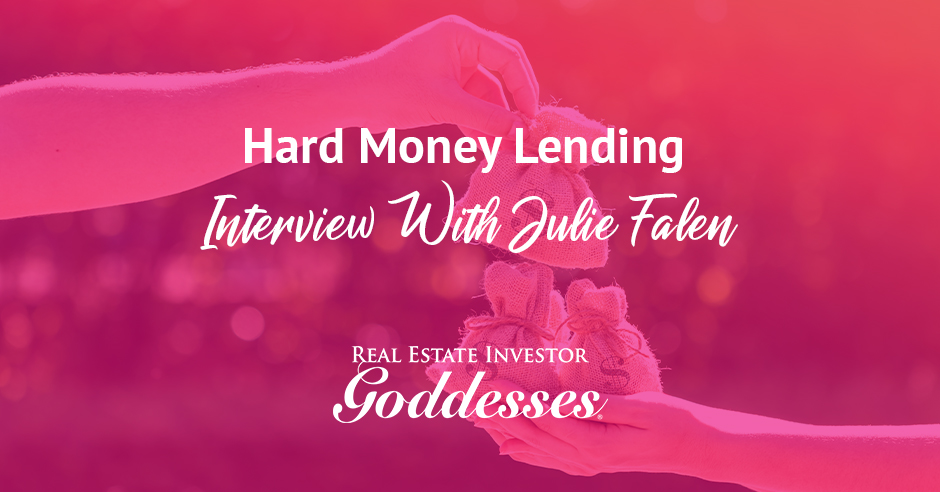
Securing a loan from traditional mortgage lenders often requires a lot of time and paperwork, apart from the fact that it poses a challenge for people who are not qualified for conventional loans. Hard money lending specialist Julie Falen joins Monick Halm in the podcast to talk about how borrowers can get away from this predicament. For years, Julie has been helping people secure hard money loans to achieve their investing goals, whether in flipping or rental properties. Hard money essentially does away with the stringent restrictions of traditional lenders and directly links the borrower with a private lender who is willing to take a risk in your investment. Listen in and see if hard money is the right loan option for you.
—
Listen to the podcast here:
Hard Money Lending – Interview With Julie Falen
I’m here with another incredible real estate investing goddess, Julie Falen. Before I get going and introduce Julie, I want to tell you all about a free webinar that I’m hosting on how to get started in real estate investing even as a busy professional woman. If you have been trying to get into the game and haven’t been sure about how to get started and what steps you need to take, this is the perfect webinar for you. You can go to our website RealEstateInvestorGoddesses.com, click on Get Started to sign up. I hope to see you all there.
Back to our interview with our amazing goddess, Julie Falen. I invited her here because she does something that many investors need help with. She helps investors find money to purchase their property. That’s one of the biggest questions I get, “How can I pay for this? How much money do I need? How do I get money if I don’t qualify for conventional loans?” Julie helps people do that. She’s a hard money loan specialist. After getting her MBA, she moved to Los Angeles for TV but soon transferred her skills for numbers to doing mortgages.
She was licensed in 2003 and worked as a loan officer for World Savings and others and presented classes to agents and buyers. In 2008, she became a full-time investor doing thousands of deals in California and out of state. In the last few years, she specialized in hard money loans. Her business is helping others to use it to achieve their investing goals, whether for flipping or for rental. She also teaches a monthly class for beginning investors. She’s a wealth of information. I’m so excited to have her. Welcome, Julie.
Thank you so much, Monick. I’m so excited to be here and be here with you. This is going to be perfect with your webinar too. That ties in.
It sure does. I’m thrilled to have you. I ask about different investor stories and I always start at the beginning, so how did you get started in real estate investing?
My situation or my start is not that different from so many other people, including many of the goddesses that you’ve interviewed. Besides the fact that I had my real estate license, I was doing mortgage loans, and that was when the rates were dropping and people were refinancing. There was a run-up in the market also where people were buying property and flipping it 2 or 6 weeks later for $40,000 to $50,000. They’re ridiculous amounts. I thought, “I understand money. I should be able to do it. I’m going to give it a try,” especially because you could do 100% financing back in that day. The banks were like, “Take the money. We want to give you money.” This is crazy.
I moved here. I’m a written native of Chicago and I spent a few years in Kansas and I moved out here. I have family in Kansas City and I thought, “I don’t know if I can afford Los Angeles now or to start building. Although I’m going to try and do it,” but I always knew I could do Kansas City at the same time. I looked and found a friend who had good credit and he had cash in the bank but no experience whatsoever. I did the loan for him, but he was the borrower and together we bought this condo in Los Angeles. I thought, “This is going to be great. We’ll be able to rent it and get some cashflow.” I had also read Rich Dad Poor Dad, the purple book, which went out and read before but it was never super-successful until it was purple and yellow, which I find interesting. That was the other thing that, besides doing the mortgages, it got me thinking and changing my mindset about real estate and turning into using that as an asset and cashflow. It’s a life-changing book for sure.
It changed me and got me going too. At least 8 or 9 out of 10 of the women I’ve interviewed read that book and that got them started, so you’re in good company. You are in the mortgage industry. You got that Los Angeles property and bought a condo. Did you get money in the city as well?
Hard money allows you to close a deal in as fast as seven days. Share on XI did later, but not at that time.
How did you get into hard money lending?
My mom passed away in 2005, which is around the same time that I was doing the mortgages. It took a couple of years but then I got some money from an inheritance and that definitely always helps with a career in getting started with real estate investing. I was doing wholesaling. I was working on doing wholesaling at any rate and making offers trying to get lots of property under contract. I had met this gentleman who had his own real estate club and he asked me to come and speak there to his students about wholesaling and a little bit about lending.
He also turned into a mentor for me for my first hard money loan here in California and walked me through it. Having been in the mortgage business, I looked at that and compared it to the hard money loans and I’m like, “This was so much simpler, faster and so much less paperwork. I want to do this.” It makes so much more sense. I can help other people do it and get more deals myself, so I liked it. Also, it’s so much simpler to figure the amount of payment you’re going to do because everything is simple interest. You’re not talking to any amortized loans and building equity, generally speaking. It’s for the fix and flips and it’s for rental properties when you can do something any other way. I got to do many more loans and help lots more people.
Let’s back up a bit because I bet not everyone reading necessarily knows what hard money lending is. I remember when I first heard it, it sounded a bit nefarious. It was like some back alley thing. It sounded scary. When I first heard about hard money lending, I’m like, “I don’t know about this,” but we used it to get one of our flips, “This is amazing.” I’d love for you to define it. What is hard money lending?
I’m so glad you asked that question because it is an intimidating statement. It does sound scary for someone who’s hearing about it for the first time. Simply put, hard money is private money. It is anything that is funds provided that are not government-backed. It has nothing to do with Fannie Mae or Freddie Mac, Ginnie Mae, VA, FHA, or any of those other loans, which are more regulated by the government. It’s outside of that realm. If you were going to be a lender, that would be a hard money loan. If it’s going to be a hedge fund, and it’s outside of the regular bank or government thing, that’s hard money. Hard money and private money are pretty much interchangeable terms. Hard money, however, is used more by companies that specialize in making those kinds of loans to investors.
What would be the advantage? Why would somebody want to go and get a hard money loan versus getting a loan from a bank that’s backed by the government?
There’s a ton of people and I’m sure you have spoken to many of them in your various appearances. Their experience with loans, any home loan, is basically buying their own homes. Would you say that’s true?

Hard Money Lending: If you’re an investor and you don’t have the time do all the paperwork for a conventional loan, then hard money is for you.
Yes.
They know about going to a bank, a mortgage, or a broker person who tells them, “You have to get pre-approved and pre-qualified. I want to see your tax returns, pay stubs and your W-2s for the last couple of years, and the birth certificate of your son.” It almost gets crazy with the paperwork that you have to do. It’s like, “We’ll get this letter for you that you can send to realtors and be prepared that if you get something, an offer, you’re going to have to wait.” If you’re an investor, you want to pull that trigger much faster. You don’t have the time to go through all that rigmarole, and you don’t want to either, because you’re going to lose the deal. You could do that to somebody who’s using hard money. That’s why people need to know about hard money and need to find a way to utilize it because we can close the deal as fast as seven days from the planning to having a contract to completely closing escrow.
If you need it, we could do it in three days and certainly refinance. Even if you’re refinancing your personal residence to pull money out in order to buy another property that would still qualify. We could still do that loan fast, seven days, and you can get the property. It’s like the golden rule. If you have the money to pay and get the deal done faster, meaning the real estate agents get their commission faster, if that’s involved, or the seller get their money faster. The one who has the cash, fast loan, or the fast cash, they’re the ones who are going to likely get that deal.
That makes a big difference in a competitive market. There are a lot of offers and being able to close quickly can get you the upper hand.
Even when there were all those foreclosures going on in the bank that owns the properties. The banks wanted to get rid of everything as fast as they could too. If you made an offer to a bank, the person who had the hard money loan with their own money is definitely going to get it faster than somebody going through an agent and a mortgage broker who wanted it for themselves because the banks were losing so much money all the time when the crash happened. They realized, “I wanted to get it off my books. Sell it.” Hard money was a great industry to be in then. It’s still good now but money is still a competitive market. They’re competitive in trying to get a property under contract so it’s even more important that you have that money readily available to you. We’ll provide a proof of funds so you can show it to whoever you’re selling that, “Monick is saying we will provide the funds for this deal. You have an A, B, C, D and E.”
I know that with us, when we used the hard money lender, being able to get the cash fast was a benefit, but the real reason why it was useful for us is because we weren’t W-2 employees. We have self-employed individuals and have a lot of tax write-offs. Even though we had money in the bank and income, it didn’t show on our tax returns. It was hard to prove income, so it was hard for us to get a conventional loan. We were able to get a hard money loan instead and that was a benefit for us. How do you guys look at borrowers? How can somebody borrow money from a hard money lender?
You make an excellent point with that because there are tons of people out there that don’t show a whole lot of income on their taxes because they’re not W-2 and it can be anybody from somebody running a beauty salon to a real estate agent and to anybody who’s self-employed. It’s a big problem with getting conventional loans. There’s something that I like to call semi-hard loan prime, but it’s not the subprime of years ago, which was a bad debt. It’s definitely a no.
These loans are great for individuals who don’t have or don’t show a ton of money. We want to know that a borrower has income and you don’t need to see or prove how much income you’ve got. Only that you’ve got some ability to make payments. Under semi-hard loans, it is stated income. You recognize that I’m sure and the readers will remember stated income loans. That was something that was used a ton long before the boom, so people like you, me, and those who are self-employed and entrepreneurs.
Investors who have the money to pay are more likely to get a deal. Share on XA stated income loan simply means that you’re saying, “I earned $1,000 or $6,000,” or whatever it is per month. We don’t need to verify it because we’re going to take a risk. There will be equity in the property or within a bank statement to see that you have deposits that are going to make it clear that you have the ability to make the payments on the loan. Those are in between hard money rates and conventional Fannie Mae rates. They’re a nice halfway point. They’re great for people who are buying their own properties or even refinancing their own. You don’t have to prove all that stuff. They may take a little bit longer on some of them.
Hard money is still going to be fast but if you’re talking true hard money, you’re talking about that first property, generally, every lender is going to look at the collateral or the piece of real estate. We’re going to do our research based on the value that we think the property has now and the value that you can create and sell it down the road. If we know that there’s going to be a chunk in there of good solid equity of 30% by the time you’re done, it reveals that’s a risk we’re willing to take and we’ll fund the project. It’s the collateral. It’s the property. You want to see a good property and somebody who’s able to make it nicer.
What properties do you help investors with? That sounds like that could be a flip but are there other types of properties you help with?
Absolutely. We’re not limited to the flips. Personally, I do loans for flips. For most people, when they hear hard money, they automatically think it means flips or only fix and flips. That’s not true at all. The majority of the clients that I have in the loans that we do are for rental properties, properties that they already own and they want to take some money out, apartment buildings, commercial buildings. Also, duplex, triplex, fourplex, small apartment building, large apartment buildings or retail. There are a lot of people, especially in Los Angeles, that have 1 or 2 businesses downstairs and they live upstairs. It’s called a mixed-use property. There are a lot of people in it and it’s tough to get a conventional loan on that.
You have to prove all kinds of things. I won’t even go into that, but we make hard money loans on loans too. Even in construction. If somebody is building something from the ground up or tearing down a house and building a new one that’s different than a flip, it’s still going to be resold but it’s still considered construction. I can also do loans on industrial warehouses that are downtown, office buildings, and even raw land. If people are buying the land to build on or taking money out of the land and own it free and clear. That’s something that a whole lot of other lenders around here don’t do. We’re not going to let you do that at Mojave, but if it’s here in Los Angeles, absolutely. I’ve got a couple in Malibu that we’re working on.
The question then is, what don’t you do? What wouldn’t you lend on?
I don’t lend to hotels and large construction projects. Pretty much the maximum loan that I would do is $10 million and that would be unusual. If I have something like that, I can send them out to other people who can do them, which is fine. Most of the people that I’m going to be working with are going to be having properties that were better somewhere under $5 million. Unless I’m lucky and I get more Beverly Hills people. Don’t do any of those big projects. It was interesting this meeting that I was at. They talked about warehouses and industrial things for marijuana because some people want to get into that and they think it’s going to be a fabulous and growing business. We won’t do that either. We won’t do loans for that property where they’re going to house a business in there. I don’t do loans for businesses. It’s got to be a specific piece of property. There’s a lot, I know. It’s a gamut.
It’s amazing and it’s a good find out that there are alternative lending sources for non-conventional borrowers or non-conventional properties because a lot of people fall into that category and go, “I don’t know how to pay for this.” It’s nice to know that there are options out there.

Hard Money Lending: Hard money loans are great for people who don’t qualify for conventional loans just because they cannot easily prove their income.
A lot of people think that investing is only for houses because they’ve either read Rich Dad Poor Dad, or they’ve gone to courses, seminars, or something. Almost everybody always talks about houses, single-family residences but we can do condos to 5, 10 units, or whatever it might be. It opens up a whole other world of properties that people can invest in using hard money.
This is something that I could talk to you forever about this, but I want to get into over more about your story. We learn so much more from what goes wrong than what goes right. My question for you is, what’s your biggest mistake in your real estate investing career, and what did you learn from it?
I will tell you. Going back to that condo that I bought in Los Angeles with a friend. I thought that I could run, rent, manage it, and it would be okay. I thought my numbers were right. I thought that I had calculated everything correctly and came to find out that I couldn’t rent it for what I thought I could rent it for. My friend, who’d gotten his down payment money back, he was like, “I will help you do this so we can both get cashflow but you have to run the whole thing,” which I did. I had no problem with it but I couldn’t create cashflow. It was hard. It was a condo, so we had the Homeowner’s Association plus the taxes. The main thing was I couldn’t get the rent that I thought that I could get. We ended up losing that property on a short sale. I had to do a short sale on. It didn’t have the rent because I was having to personally cover the shortfall every month from the rent to what the expenses were. That has been my biggest, painful and expensive mistake.
What have you learned from it though?
I learned that I cannot rely only on myself. My pride and hubris were like, “I know what I’m doing. I know real estate. I know how to comp things. I know how to look.” It’s not enough. You do have to ask other people who are more familiar or maybe experts there. Talk to some real estate agents and don’t think you can do everything yourself. Talk to property managers and know what you can get. It turned out that there had been some other stuff in that building where people would work together to inflate the value of the condo above it or across from it so it looked like it could be a great flip. It turned out that it was not a legit transaction. Talk to the title person and all the people you might have on your team. Talk to them and find out as much as you possibly can about the area, property, and the history if it’s a building. There were a lot of lessons in that one, I’ll tell you.
It’s a painful lesson, but you’re sure that you’re not going to make those mistakes again.
Although I came close to one, and I’ll tell you one other lesson from that is I don’t invest in Los Angeles anymore. That’s when I moved my investing focus to Kansas City. I only have Kern County because it was a great area in California City and Bakersfield during the crash. They could pick up houses for $35,000 to $40,000. I got one for $15,000. That was a cashflowing property even though it’s in a place that nobody’s heard of. The rest of it was like, “I’m not going to risk $300,000 anymore. I’m going to go to the properties to the areas where I know I can have cashflow, make money, have $100,000, $200,000, and $300,000 a month, and never have negative cashflow.” Negative cashflow is no fun.
The flip side then is what are you proudest of?
Hard money helps you get the upper hand in a competitive market. Share on XI’d say what I’m proud of is surviving the industry and the crash and back to developing a good clientele and a book of business. I had a real estate investment club that ran that for two years, I talked to and met a whole lot of other people that I could help get into investing, as well. I know that you’re the same. You’d like to help people and teach people and that’s such a rewarding thing. I’m proud that I now have six rental properties. Each one has appreciated and cashflows. Despite the big fears that I had at the beginning and the guys that walked you through everything, I’ve done some real estate on my own and I’m going to go with it.
There’s so much else I want to ask you, but we still have your trinity. Our trinity is a brag, gratitude, and a desire. Before we get into the trinity, I wanted to ask you, what’s the best way for people to reach you and find out more about what you do?
My phone number is (323) 252-1027 or they can reach me via email at [email protected]. I did want to mention one thing because you and I talked about this before quickly. Is it true that you don’t need cash with credit to get a loan? It’s one of the huge things, that’s why I want to mention it. It is true that you don’t need your own cash or credit but you need somebody’s. One hundred percent financing is gone. You need to have at least 10% of the purchase price. Usually, 20% coming from somewhere. It doesn’t have to be you. I don’t care where it comes from, but if I’m going to put my money at risk, you have to put some money at risk too. That’s the lending environment going on now.
If somebody can get 10% to 20% of the purchase price down, then they can access it. The money doesn’t have to be your own, so that’s good to know.
That’s California or pretty much anywhere in the country.
Thank you so much. Let’s do your trinity. What are you celebrating now? What’s one brag?
I am celebrating the anniversary of the class that I started for beginning real estate investors who don’t know where to start and don’t know where to go. Even if they’ve taken an expensive course, they don’t know. It’s grown and I’m now adding money management and financial management to that class. I’m excited about going into another year. It’s getting popular.
What are you grateful for?

Hard Money Lending: Although hard money is usually associated with flipping, many hard money borrowers also invest their money in rental properties.
I’m most grateful for my health. Without the health, you can’t do anything. Health is wealth and so is your network. I’m able to keep up with a great amount of energy going, doing, and talking to people. Without help, I couldn’t do that.
Lastly, what’s one desire that you have?
The desire that I have is around real estate and it is to get into more apartment building investments. I want to buy 6 to 20-unit buildings, probably out of state that’s where it’s affordable, and start building my assets in apartments.
So shall it be or so much better than you can imagine.
Thank you.
You’re welcome. Thank you. This was so useful and valuable. I loved it. If you guys want to connect with Julie, you can go to [email protected]. You can also call her at (323) 252-1027. You can connect with me at RealEstateInvestorGoddesses.com. There you can sign up for how to get started in real estate investing even as a busy professional woman and you can get a free eBook, The Real Estate Success Blueprint, the crucial steps every woman must take to be a successful real estate investor. Thank you all and we will see, hear and talk to you with another real estate investor goddess interview.
Important Links:
About Julie Falen

An active investor, instructor and highly experienced Real Estate Lending and Loan specialist, Julie is a Coach to new investors, a speaker to groups interested in Real Estate Investing and general Wealth Building and she hosts a Live Radio Show weekly called JULIE TALKS MONEY on KCAA RADIO (also available on Podcast). Licensed in Real Estate since 2002 and a former Investment Advisor Representative with Series 63 and 65 SEC licenses and life-licensed, Julie is uniquely qualified and positioned to speak to realtors, investors loan officers and curious new investors about hard money and non-conventional loans using STATED INCOME, and how they can be beneficial to investing strategies, as well as how to utilize IRAs and insurance for investing and retirement wealth.
Julie is Passionate in her purpose to help people (especially women), become more Financially Literate and be prepare for a wealthier lifestyle now and retirement later. In her Radio Show, she brings her incredible and extensive network of experts garnered over more than 16 years and asks them to share their knowledge, strategies, tips and insights about making Money, Growing it and Keeping it through Real estate, stocks, collectibles, various savings vehicles ad technology.
Love the show? Subscribe, rate, review, and share!
Join the Real Estate Investor Goddesses Community today:





